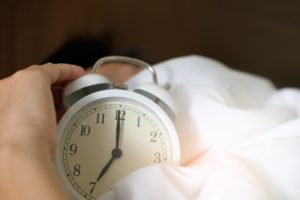Healthy Sleep for Healthy Aging

March 10-16, 2019 Is National Sleep Awareness Week
It’s harder to get a good night’s sleep as we grow older. We might find ourselves in bed for hours, unable to drift off. Or, we might fall asleep right away, only to experience a period wakefulness in the middle of the night. Maybe we wake up at 4 a.m., and lie awake until dawn. Painful health conditions interfere with sound sleep. Of course, those middle-of-the-night bathroom trips can get us out of bed, interrupting sleep night after night. And even if we’re sleeping for the recommended 7 or 8 hours, we nonetheless might not feel rested the next day.
Sleep research is helping experts understand why it’s harder to sleep well as we grow older. Researchers from the University of California, Berkeley (UCB) used sophisticated brain imaging to observe the brains of sleeping elders and, in an article published in the journal Neuron, they noted that it’s a two-part problem:
- As we age, less of our sleep time is marked by the types of brain waves that help us remember things in the long term.
- Older brains have trouble balancing the chemicals that help us transition into sleep, and then to wake up.
We shouldn’t take sleep problems lightly. Sleep scientist Matthew Walker, UCB professor of neuroscience and lead researcher of this study, reports that that sleep deterioration is linked to a host of health problems, including dementia, heart disease, obesity and stroke. Said Walker, the director of the UCB Center for Human Sleep Science, “Nearly every disease killing us in later life has a causal link to lack of sleep. We’ve done a good job of extending life span, but a poor job of extending our health span. We now see sleep, and improving sleep, as a new pathway for helping remedy that.”
What can we do to improve sleep as we grow older?
The first thing to know, said Walker, is that medication is not the answer. Sleeping pills may help us drift off, but drugged sleep is largely lacking in the natural sleep cycles that are best for our brains. “The American College of Physicians has acknowledged that sleeping pills should not be the first-line knee-jerk response to sleep problems,” Walker reports. “Sleeping pills sedate the brain, rather than help it sleep naturally. We must find better treatments for restoring healthy sleep in older adults, and that is now one of our dedicated research missions. Don’t be fooled into thinking sedation is real sleep. It’s not.”
Talk to your doctor if you’re having trouble falling asleep, staying asleep, or waking up feeling refreshed. Your doctor might suggest lifestyle changes, such as a better sleep environment, avoiding caffeine or alcohol, turning off your smartphone and computer late in the day, and getting more exercise, at the right time. You might be referred to a sleep specialist to diagnose the problem and suggest treatments.
Scientific research may lead to better treatments in the future. Experts are studying such non-drug interventions as electrical brain stimulation and the use of acoustical tones that boost deep sleep. So don’t lose sleep over losing sleep! Seek help right away, no matter what your age.
The information in this article is not intended to replace the advice of your healthcare provider. If you’re having trouble falling asleep or staying asleep, discuss the problem with your doctor.

